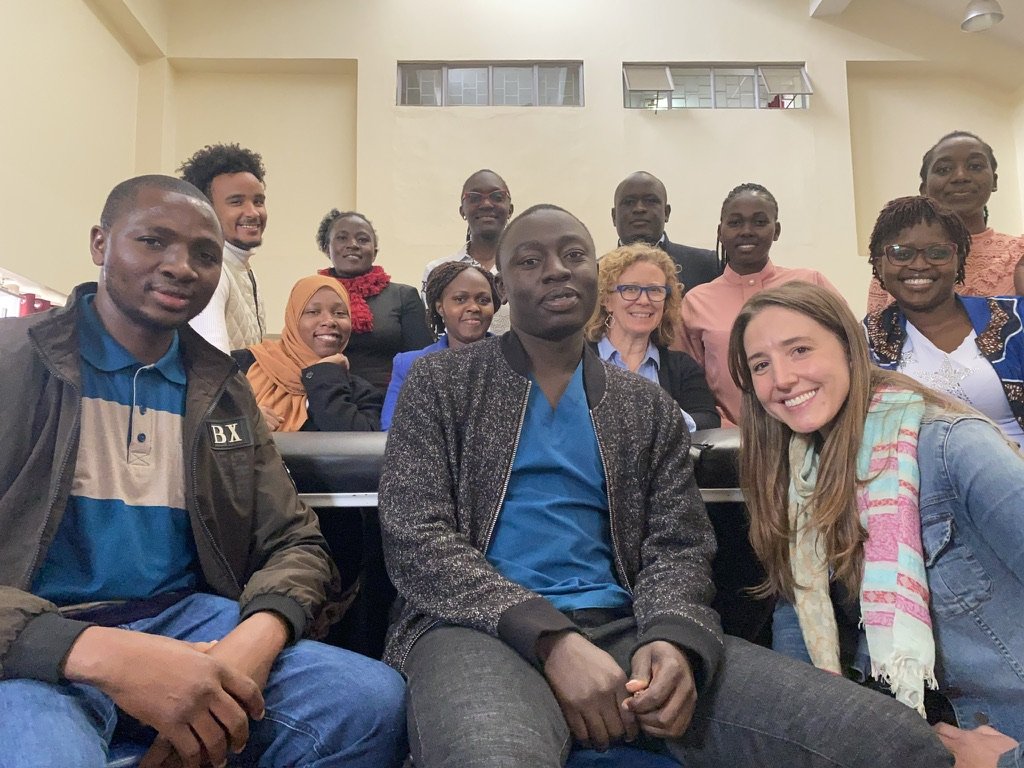Chatham Alums Help Spread PT Knowledge to Therapists in Kenya
Jillian Caster, DPT ’08 (front right), and Associate Professor Michelle “Missy” Criss (middle row, second from right) pose with physiotherapists they taught in Nairobi, Kenya. (Photo courtesy of Michelle Criss)
When Jocelyn Vojcsik, DPT ’10, went to Kenya in November to teach working physical therapy students, she wasn’t sure what to expect. What had the students already learned? What equipment would they be using? Would she have to change her lesson plans?
Even with all the variables and unknowns, Vojcsik went into the two-week program with confidence.
“That could be overwhelming or daunting,” she said during a phone interview in December. “But I think Chatham sets you up to have all of these tools in your toolbox.”
Vojcsik, who specializes in neuromuscular treatment, was one of a handful of Chatham University alumni and faculty in the East African country last month. They were helping younger physical therapy professionals in Nairobi learn specialized practices in neuromuscular, wound, and pulmonary therapy. It was part of a program run by The Jackson Clinics Foundation which helps promote physical therapy practices in Kenya.
The foundation tapped Barb Billek-Sawhney, TDPT ’11, to help find people interested in sharing their knowledge of the practice, which is known as physiotherapy in Kenya. She sought out Chatham alumni like Vojcsik and faculty like Michelle “Missy” Criss to give instruction on PT theory, patient education, and hands-on practice.
Missy Criss uses a device to show students how to utilize electrical stimulation for wound care. (Courtesy of Michelle Criss)
When she was asked to find experienced physical therapy educators, Billek-Sawhney said, she immediately thought of Chatham instructors Sue Perry and Missy Criss. “If I had something wrong with me or a loved one, I would want them to treat me or my loved one,” said Billek-Sawhney, who used to be a professor at Chatham. “That’s how good they are.”
Criss said she thought educators and alumni from Chatham were a good fit for the program because of their focus on finding information and solving patient problems independently. It was an attitude shared by her students in Nairobi.
“Every student said, ‘I’m here because I want to do better for my patients,’” Criss said. “It was a phenomenal way to walk into teaching.”
Robert Angir, a physiotherapist working in the public hospitals of Kenya’s Homa Bay County, was one of those students. He signed up for the the course taught by Vojcsik after noticing a prevalence of nervous system conditions in his patients.
Speaking to Pulse over email, Angir said he wanted to share with his peers what he learned from Vojcsik and her husband, Greg Vojcsik, DPT ’10. It’s already changed the way he approaches patients.
He added: “Dr. Michelle Criss and Dr. Jillian Caster left us with a wealth of knowledge on the wound assessment and PT management of different wound types.” Even nurses have consulted him on wound dressing after seeing the positive results of the treatments he applied, he said.
When she finished her undergraduate education, Jillian Caster, DPT ’08, said Chatham’s School of Health Sciences topped her list of PT programs in Pittsburgh because she was interested in the University’s use of problem-based learning.
Caster, now a wound and lymphedema physical therapist at Allegheny Health Network, went to Kenya to share her expertise. She showed her students one of her tried-and-true classroom activities: treating “wounds” on melons as if they were patients. She gored the fruit herself and had students put bandages over the exposed flesh to simulate dressing a patient.
“I love teaching,” Caster said. “I get so excited for people to be able to expand their knowledge and just learn more.” She hoped sharing her passion for wound care would rub off on the students she taught.
Vojcsik felt the same way. “It just felt very rewarding to be able to share my passion and the knowledge that I have worked hard to, hopefully, foster and keep fresh,” Vojcsik said. “I think it was exciting for me to be able to share that knowledge and for it to be received.”
Billek-Sawhney said there are more trips planned to Kenya to keep the exchange going. “Everyone who was involved gets the opportunity to share their knowledge and expertise not just here locally, but internationally,” she said.
Learn more about Chatham University’s DPT program, or explore other opportunities in the School of Health Sciences.
Mick Stinelli is a writer and digital content strategist at Chatham University. His work has previously appeared in the Pittsburgh Post-Gazette, 90.5 WESA, and WYEP.org.
This story was updated on Dec. 14, 2023 to include comments from Robert Angir.


